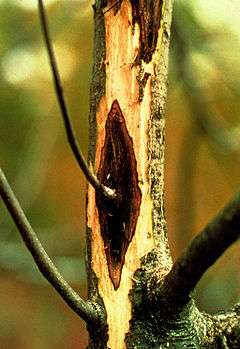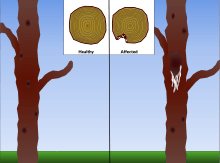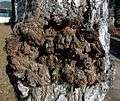Canker
A plant canker is a small area of dead tissue, which grows slowly, often over years. Some cankers are of only minor consequence, but others are ultimately lethal and therefore of major economic importance in agriculture and horticulture. Their causes include such a wide range of organisms as fungi, bacteria, mycoplasmas and viruses. The majority of canker-causing organisms are bound to a unique host species or genus, but a few will attack other plants. Weather and animals can spread canker, thereby endangering areas that have only slight amount of canker.

Butternut canker is a lethal disease of Butternut trees, and has no cure.
Although fungicides or bactericides can treat some cankers, often the only available treatment is to destroy the infected plant to contain the disease.
Examples

Tree cankers (right) are caused by injuries to the bark that allow pathogens or insects in to infect the tree. Compared above is a healthy tree and segment (left) to a tree infected and containing a canker.
- Apple canker, caused by the fungus Neonectria galligena
- Ash bacterial canker, now understood to be caused by the bacterium Pseudomonas savastanoi, rather than Pseudomonas syringae. After DNA-relatedness studies Pseudomonas savastanoi has been instated as a new species.[1]
- Butternut canker, caused by the fungus Sirococcus clavigignenti-juglandacearum
- Bleeding canker of horse chestnut, caused by the bacterium Pseudomonas syringae pv. aesculi
- Citrus canker, caused by the bacterium Xanthomonas axonopodis
- Cypress canker, caused by the fungus Seiridium cardinale
- Foamy bark canker of oaks in California, caused by the fungus Geosmithia putterillii
- Dogwood anthracnose, caused by the fungus Discula destructiva
- Grape canker, caused by the fungus Eutypa lata
- Honey locust canker, caused by the fungus Thyronectria austro-americana
- Larch canker, caused by the fungus Lachnellula willkommii
- Mulberry canker, caused by the fungus Gibberella baccata
- Oak canker, caused by the fungus Diplodia quercina
- Pine pitch canker, caused by the fungus Fusarium circinatum
- Plane anthracnose, caused by the fungus Apiognomonia veneta
- Poplar canker, caused by the bacterium Xanthomonas populi
- Rapeseed stem canker, caused by the blackleg fungus Leptosphaeria maculans
- Rose cankers, caused by the fungus Leptosphaeria coniothyrium and Cryptosporella umbrina
- Scleroderris canker, caused by the fungus Gremmeniella abietina
- Southwest canker, caused by environmental conditions (cold and sun)[2]
- Tomato anthracnose, caused by the fungus Colletotrichum coccodes
- Willow anthracnose, caused by the fungus Marssonina salicicola
 Canker on a birch
Canker on a birch- Canker on a beech tree.
- Canker on an ash tree in North Ayrshire, Scotland.
gollark: Could the OpenCL of Turbokristforge not run as a CPU miner too?
gollark: Welcome back!??!!!????!!!!!??¡!!?!!!!!!!¿
gollark: At your shop or GMart?
gollark: Don't be crazy.
gollark: Needs more java.
See also
References
- Gardan, L.; Shafik, H.; Belouin, S.; Broch, R.; Grimont, F.; Grimont, P. A. D. (1 April 1999). "DNA relatedness among the pathovars of Pseudomonas syringae and description of Pseudomonas tremae sp. nov. and Pseudomonas cannabina sp. nov. (ex Sutic and Dowson 1959)". International Journal of Systematic Bacteriology. 49 (2): 469–478. doi:10.1099/00207713-49-2-469. PMID 10319466. Archived from the original on 15 April 2013.
- Southwest Canker
This article is issued from Wikipedia. The text is licensed under Creative Commons - Attribution - Sharealike. Additional terms may apply for the media files.